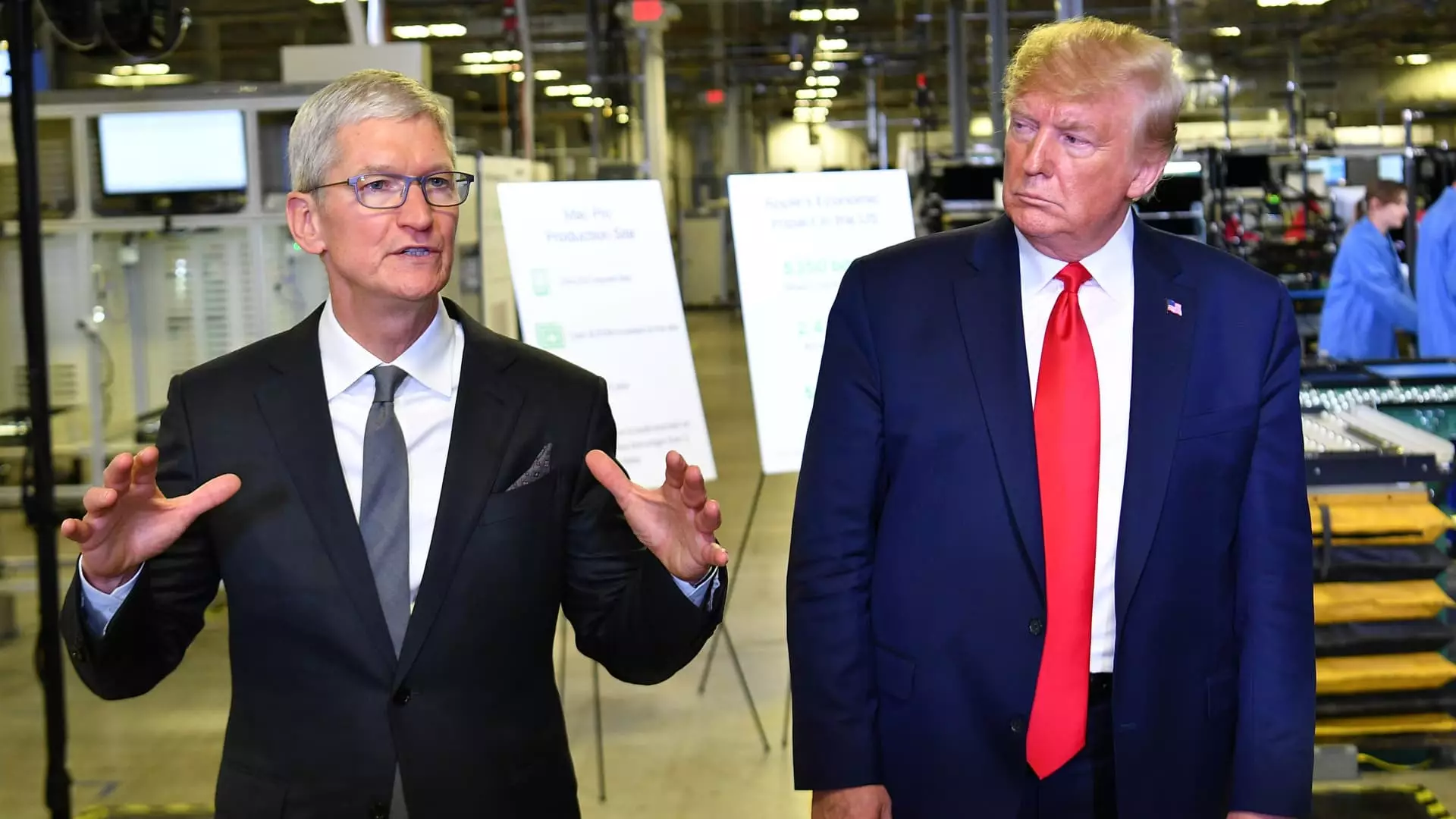In a startling social media declaration that echoes the chaotic tone of his administration, former President Donald Trump threatened Apple with an aggressive tariff on iPhones if they do not manufacture their devices domestically. This move adds another layer of complexity to already fraught U.S.-China trade relations and raises questions about the feasibility of such a directive. Trump proclaimed that if Apple does not produce their smartphones within the United States, a punishing 25% tariff will be imposed. This rhetoric suggests not only a misunderstanding of global economics but also a reckless disregard for the intricate webs of relationships and operations that define modern manufacturing.
There is an inherent contradiction in Trump’s demand. While he claims to champion American manufacturing, his tariffs would likely result in skyrocketing prices for consumers. Wall Street analysts have already put forth alarming estimates, suggesting that producing iPhones domestically could push the price of a typical device up to a staggering $3,500, a number that places the product well beyond the reach of the average consumer. This is a classic case of economic self-sabotage, where grand posturing threatens to undermine the very goals of job creation and industrial growth that Trump professes to support.
The Backstory: Apple’s Global Strategy
Apple’s manufacturing strategy has long relied on a global supply chain, particularly in China. The company’s rationale for this is straightforward: efficiency and cost-effectiveness lead to higher profit margins. However, the last-minute shift toward India underscores a nuanced understanding of global trade dynamics. India offers a more favorable political landscape for U.S.-based companies, as its trade relationship with the United States is generally perceived as less volatile than that of China. Still, the abrupt demand for a total shift to U.S. manufacturing reflects a desire for control over globalization that overlooks economic realities.
Investments like Apple’s $500 billion commitment to U.S. development—including innovations in AI and semiconductor production—should not be dismissed. However, they reveal just how complex this issue is; businesses must navigate a myriad of obstacles, including political fluctuations, consumer demand, and international relations. Forcing a massive company like Apple to abandon productive partnerships for the sake of populist posturing illustrates a misunderstanding of the market forces at play and a willingness to gamble with consumer interests for the sake of political validation.
Consumer Costs and Market Fallout
The potential fallout from Trump’s trade strategy is multifaceted. Beyond the immediate economic repercussions for Apple, there are broader implications for consumers. A tariff on iPhones essentially translates to less accessibility for millions of Americans who rely on these devices for work, education, and social interaction. We are witnessing a moment where political ambition is poised to directly undermine accessibility to technology, a cornerstone of modern life.
Shares of Apple saw a notable dip following Trump’s incendiary post, reflecting investor anxiety over uncertainty and economic instability. Corporate leaders like Tim Cook are caught in a perilous bind, aiming to appease political demands while maintaining profitability in a global marketplace that is increasingly sensitive to shifts in trade policy. The unpredictability surrounding tariffs has thrown a cloud over company earnings and strategic planning, and this turmoil serves as a stark reminder: when political winds shift drastically, corporate America can find itself battered, fragmented, and at the mercy of a tumultuous economic landscape.
Confronting the Tariff Threat
While Trump’s attempts to reclaim American manufacturing through tariffs aim to resonate with a base that craves job security, they risk direct harm to the economic fabric of the nation. Imposing tariffs based on vague promises of domestic production not only threatens consumer prices but also the very innovation that companies like Apple bring to the market. Greater trade restrictions may inadvertently lead to an environment where American companies may choose to curtail research and development—factors vital for sustaining industries of the future.
The dynamics between Trump and Cook, marked by past cooperation, now appear mired in a confusing power struggle that highlights a larger strategic drift. While it’s important to bolster American manufacturing, the convoluted path dictated by tariffs lacks clear foundational logic and may serve only to drown out the nuanced dialogue essential to fortifying U.S. competitiveness in the global arena. The country does not need another reckless economically-motivated tirade from its leaders, but rather a calculated approach to restore manufacturing legitimacy grounded in sustainability, resilience, and mutual interests.
The crux of the issue lies not in vilifying large corporations but in fostering an ecosystem where innovation can flourish alongside responsible governance. In an age that demands both economic integrity and technological advancement, it is time for political leaders to forge paths that do not rely on incendiary threats but instead work towards cooperative solutions benefiting both industry and consumers alike.

Leave a Reply